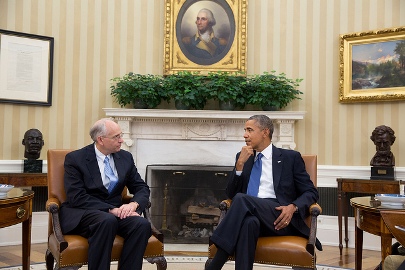Bashir refuses to grant the US special envoy a visa to Sudan: Carter
February 5, 2014 (KHARTOUM) – The former United States president Jimmy Carter has revealed that the Sudanese president Omer Hassan Al-Bashir rejected his personal appeal to grant the US special envoy for the Sudans Donald Booth a visa to meet with officials in his government.

Western officials generally avoid meeting with Bashir as a result of the International Criminal Court (ICC) warrant charging him with war crimes and genocide in Darfur. The US dragged its feet in processing his visa request for UNGA last year for the same reason.
Last November, media reports claimed that Khartoum refused to grant Booth a visa for planned talks with Sudanese officials on post-secession issues with South Sudan as well as the security and humanitarian situation in Darfur and South Kordofan.
The reports quoted unnamed officials as saying that Khartoum informed Washington that any role for the US should begin with seeking to normalize bilateral ties between the two countries and addressing the issue of unilateral sanctions and Sudan’s inclusion on a blacklist of states that sponsor terrorism.
They also asserted that issues that are considered domestic matters should not be raised during talks by Booth.
According to a report issued by Carter on his trip to Dubai and Khartoum between January 11-25, the ex-president had received assurances from Bashir that he will conduct a genuine national dialogue and seek peaceful solutions for internal conflicts and with neighboring countries as well as encouraging all opposition force to engage in this dialogue.
Carter said in his report that Sudan’s parliament speaker, al-Fatih Izz al-Din, had committed to draft a new constitution with broad participation from the opposition parties prior to the 2015 elections, saying that Izz Al-Din was keen to exchange expertise with US legislators.
He also asserted commitment of Bashir, Izz Al-Din, the ruling National Congress Party (NCP) secretary of foreign relations, al-Dirdeeri Mohamed Ahmed, and the presidential assistant Abdel-Rahman al-Mahdi, to conduct a just and genuine national dialogue besides drafting a new constitution and holding general elections.
Last December, the NCP announced that it is developing a comprehensive reform document which it described as historic. The announcement came in the wake of a government shakeup that saw the departure of several long-time NCP figures from their governmental posts.
Bashir addressed the nation last week announcing a 4-point plan for reform “to stop the war and bring peace, free political society, fight against poverty and revitalize national identity”, calling for political forces to engage in dialogue to agree on the implementation items though he did not specify practical steps to do so.
But the opposition figures who attended the speech made statements either personally or through their parties criticizing the lack of specifics and excessive generalities that gave no real signs of concessions on the part of the ruling party.
The opposition alliance said it wouldn’t enter into dialogue with the NCP until the latter abolishes all laws that restrict freedoms, release all political detainees, launch an investigation into the killing of demonstrators in September 2013 riots, enter into comprehensive negotiations to end the war in the different conflict zones, address the humanitarian situation and agreeing to full transitional status.
(ST)
